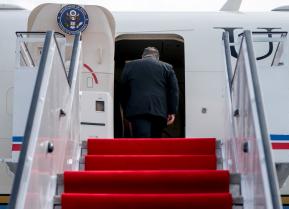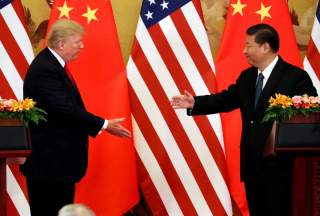America and China: Destined for Conflict or Cooperation? We Asked 14 of the World's Most Renowned Experts
The National Interest asked 13 scholars and experts to respond to the following question: Given growing tensions between the United States and China, where do you see the overall relationship headed? Towards a permanent state of competition?
Xu Feibiao, Director for the Division of Trade and Investment Studies at the China Institutes of Contemporary International Relations:
No one would deny that the relationship between the U.S. and China, the biggest power on this planet and the emerging big power, is the most important and complicated one in the 21st century.
For the last forty years, especially after the opening up and reform in China in the 1970s, the Sino-U.S. relationship has become increasingly consolidated through ups and downs. The two countries are so integrated economically and financially that any disruption in bilateral relation would lead to great losses and market vibrations in both countries and even the whole world.
Consider these facts: U.S. enterprises in China make profits of more than $200 billion every year, and China exports annually more than $500 billion in goods to the United States, the majority of which are produced, exported, and turned into profit by companies from America and other foreign countries.
The two countries have increasing entwined interests in this globalized and interconnected world, and both of them benefit greatly from the relationship. From Chinese perspective, an improved and consolidated Sino-U.S. relationship usually means a favorable external development environment for China, which is desperately needed, not to mention the technology, capital, and the huge market of the U.S., which are all important factors for China’s economy.
From the U.S. side, the benefits are also huge and obvious. It has greatly advanced America’s strategic interests, such as balancing and weakening the Soviet Union, winning the Cold War and the war on terror and countering the proliferation of WMDs. The relationship will continue to reap benefits for the U.S. in the future in such issues as climate change, countering extremism, bringing peace to the Korean peninsula and solving problems with Iran, cyber security and so on.
The huge volume of cheap and high-quality goods from China, the second largest market in the world, also benefits the U.S. greatly. One thing worth noting is that during and after the financial crisis, China has continued to buy trillions of dollars in U.S. debts and assets, and has anchored her currency to the dollar, which acts to help maintain the predominant role of the U.S. in the current international monetary system.
That trajectory of bilateral relations and deepening interlocked interests of both countries mean that Sino-U.S. relations will stay stable for the near future.
Of course, there will be more and more disruptions and frictions in the next few years because of the ‘Trump shock’ from the American side. To a large extent, the media over exaggerate the ongoing ‘trade war.’ There is a small possibility that the two countries would turn against each other as enemies, but it is also not likely that the two will become good friends. This time the adversary facing U.S. is different: a nuclear giant that is dedicating to opening up and the building up of a community of common destiny.
Check out other comments in this series from: Graham Allison, Gordon G. Chang, David Denoon, Michael Fabey, John Glaser, James Holmes, Lin Gang, Kishore Mahbubani, Robert Ross, Ruan Zongze, Robert Sutter, Xie Tao, Xu Feibiao and Wang Jisi.
Wang Jisi, President of Peking University's Institute of International and Strategic Studies and editor of The Rise of China and a Changing East Asian Order:
The China-U.S. relationship is not doomed for a Cold War-style confrontation. Neither is it destined to avoid a deadly conflict. The more likely trend on the road ahead is a further deterioration of relations until both China and the United States come to the realization - maybe following a tragic crisis - that they have to negotiate a ‘deal’ of mutual tolerance.
Looking back at history, it is China, not America, that has played a decisive role in shaping the relationship. China changed the feature of its ties with America in 1949 when the People’s Republic was founded. China again reshaped the contour of the relationship after 1978 when its leadership decided to embark on reform and opening. Since then China-U.S. economic and cultural relations have prospered. Major changes in American politics, like the civil rights movement, the financial crisis in 2008, and changes of administration in Washington, have hardly affected the landscape of U.S.-China interactions.
Now, once again, it is mainly China’s power and behavior that incur a shifting of the bilateral ties. The Americans are alarmed by China’s expansion of global influence, exemplified by the Belt and Road Initiative, and its reinforcement of the role of the state in economy and society, as well as the consolidation of the Communist Party leadership with its ideology. The current trade friction is only a reflection of the deep-rooted, enlarging cleavages of political values, power structures, and national goals between the two giants.
The United States has now identified China as a major external threat while its bonds with other countries are debilitated. China seems unruffled in its march toward becoming a global game-changer defiant against Western values and practices. However, both countries are encountering daunting challenges at home that are much greater and more urgent than geostrategic contentions abroad.
Both China and America are undergoing dramatic domestic transformations, the destinations of which will determine whether, and how, they can find a way to renovate the links that have benefited the two sides over the last forty years. China is changing more rapidly than America. But China will continue to change in its own pace and track, and ultimately in the right direction. To dodge an ill fate, the two countries should engage each other in a benign competition to see which country is better able to make their people happier and more dignified, and who will earn more respect in the world.


